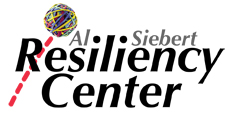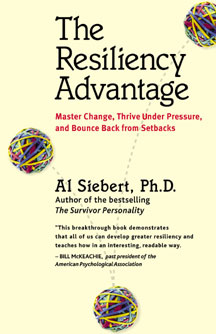Resiliency Quiz - How Resilient Are You?
by Al Siebert, PhD,
author of The Resiliency Advantage* and The Survivor Personality• Resiliency Quiz Interpretation* Winner, 2006 Independent Publisher's Best Self-Help Book

How do you react to unexpected difficulties? Healthy, resilient people have stress-resistant personalities and learn valuable lessons from rough experiences. Resilience is the process of successfully adapting to difficult or challenging life experiences. Resilient people overcome adversity, bounce back from setbacks, and can thrive under extreme, on-going pressure without acting in dysfunctional or harmful ways. The most resilient people recover from traumatic experiences stronger, better, and wiser.
When hurt or distressed, resilient people expect to find a way to have things turn out well. They feel self-reliant and have a learning/coping reaction rather than the victim/blaming reaction that is so common these days.
Take the Quiz....
Before reading further, take this quiz created by the late Al Siebert, PhD.
The Resiliency Center was founded by the late Al Siebert who studied highly resilient survivors for over fifty years. He authored the award-winning book The Resiliency Advantage: Master Change, Thrive Under Pressure and Bounce Back From Setbacks (2006 Independent Publisher's Best Self-Help book), and best seller The Survivor Personality: Why Some People Are Stronger, Smarter, and More Skillful at Handling Life's Difficulties...and How You Can Be, Too.
If you are interested in using The Resiliency Quiz in your own organization, please see our sister page at Practical Psychology Press for pricing and usage information. (Also available in French, Spanish, and German language versions.) Thank you!
© Practical Psychology Press
PracticalPsychologyPress.com



